Embargo Act of 1807 Worksheets
Do you want to save dozens of hours in time? Get your evenings and weekends back? Be able to teach about the Embargo Act of 1807 to your students?
Our worksheet bundle includes a fact file and printable worksheets and student activities. Perfect for both the classroom and homeschooling!
Resource Examples
Click any of the example images below to view a larger version.
Fact File
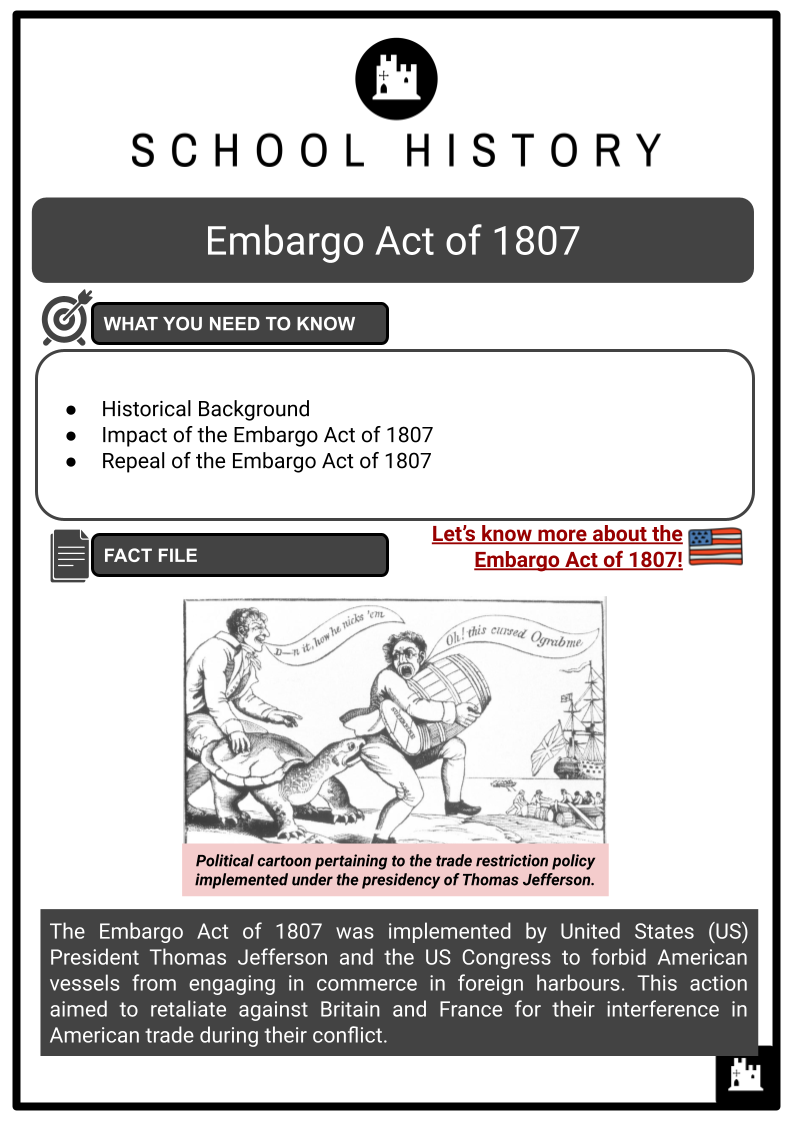
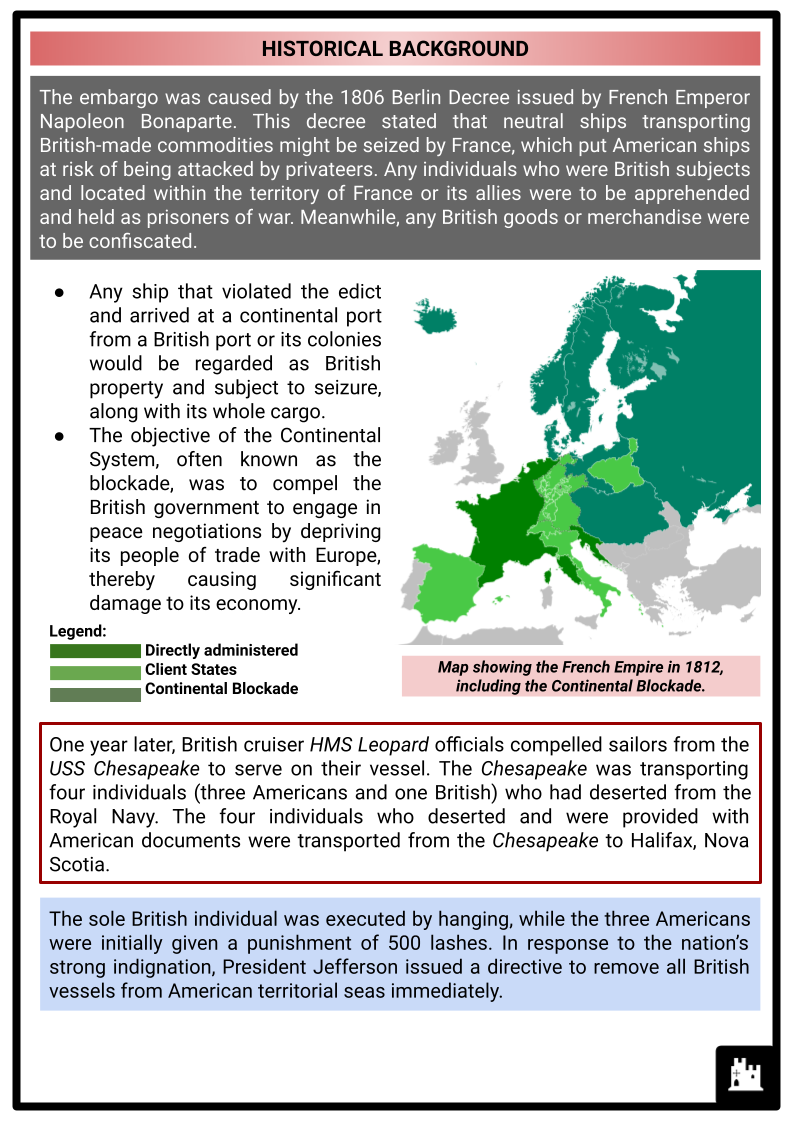
Student Activities
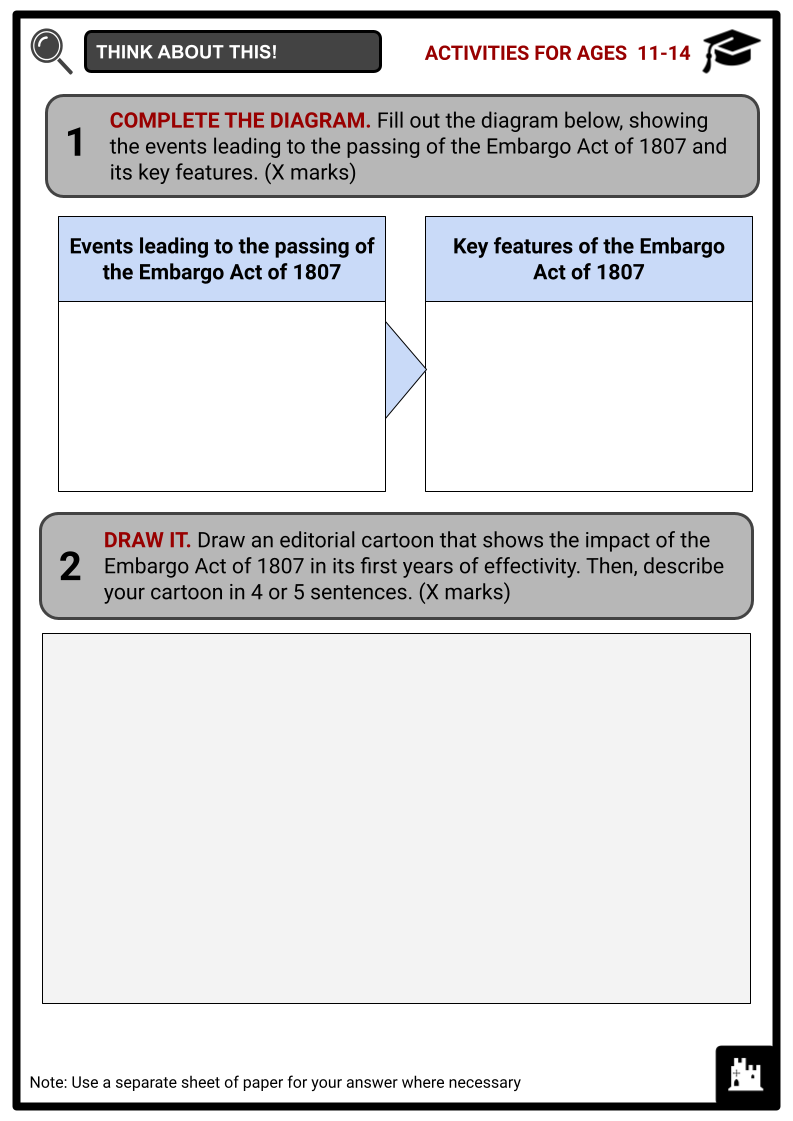
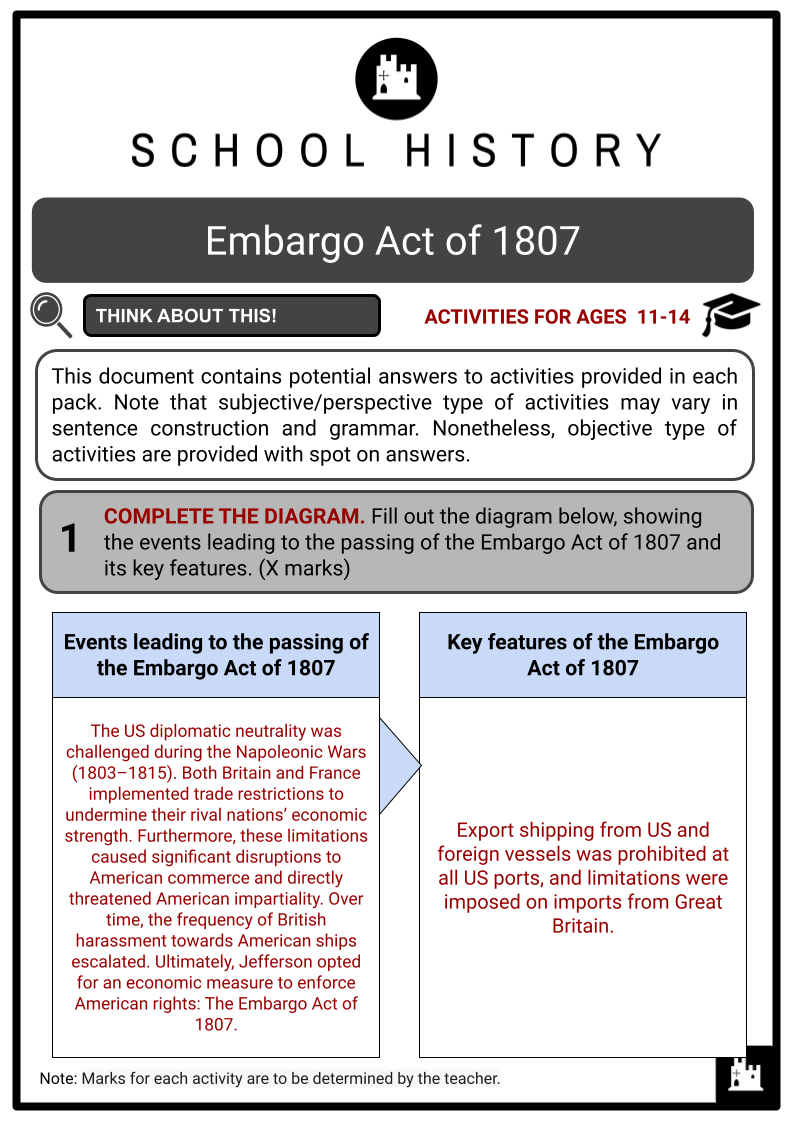
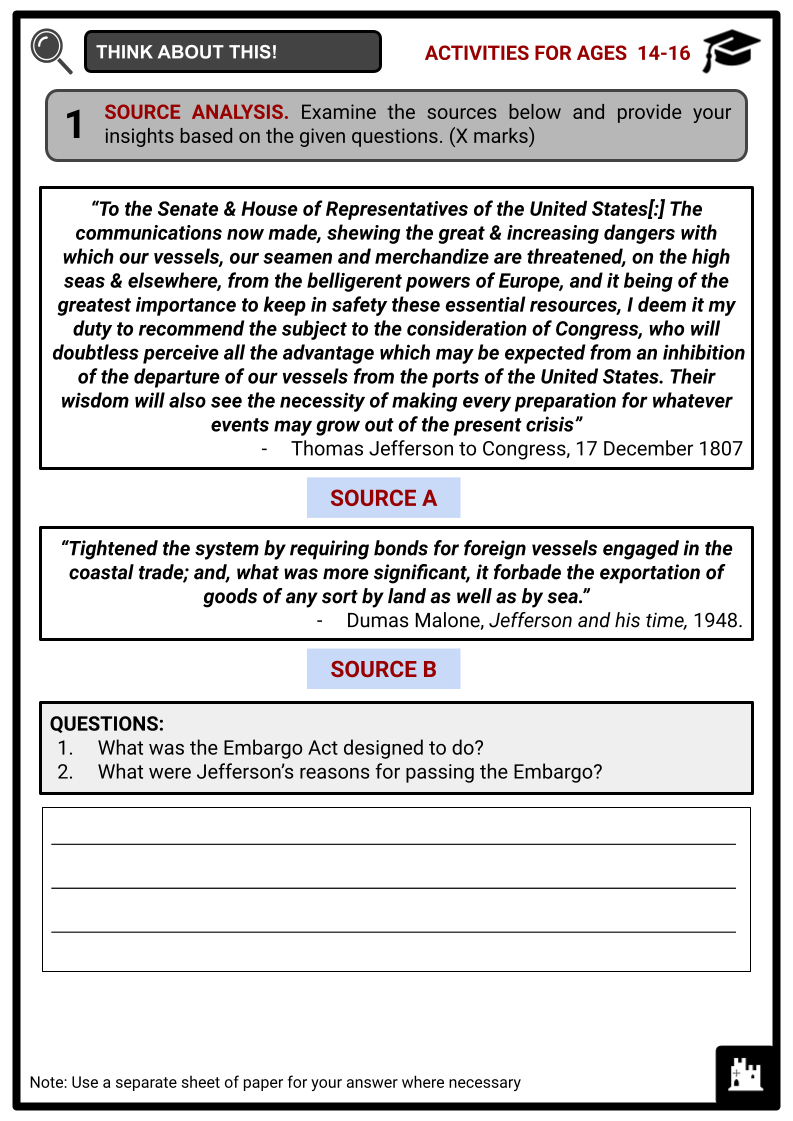
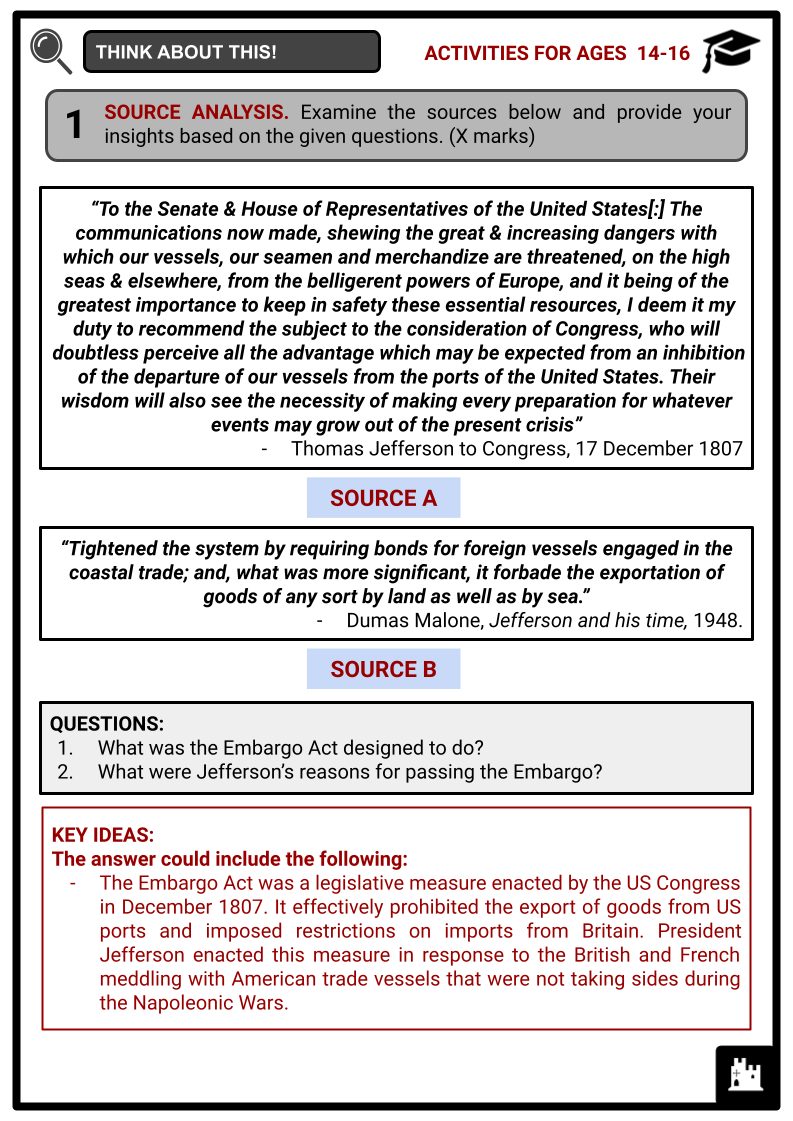
Table of Contents
Add a header to begin generating the table of contents
Summary
- Historical Background
- Impact of the Embargo Act of 1807
- Repeal of the Embargo Act of 1807
Key Facts And Information
Let’s know more about the Embargo Act of 1807!
The Embargo Act of 1807 was implemented by United States (US) President Thomas Jefferson and the US Congress to forbid American vessels from engaging in commerce in foreign harbours. This action aimed to retaliate against Britain and France for their interference in American trade during their conflict.
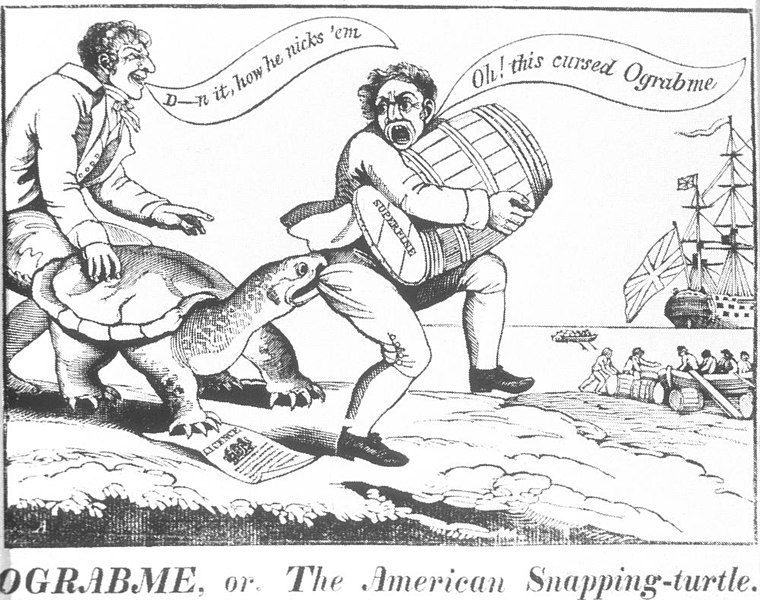
Political cartoon pertaining to the trade restriction policy implemented under the presidency of Thomas Jefferson.
HISTORICAL BACKGROUND
- The embargo was caused by the 1806 Berlin Decree issued by French Emperor Napoleon Bonaparte. This decree stated that neutral ships transporting British-made commodities might be seized by France, which put American ships at risk of being attacked by privateers. Any individuals who were British subjects and located within the territory of France or its allies were to be apprehended and held as prisoners of war. Meanwhile, any British goods or merchandise were to be confiscated.
- Any ship that violated the edict and arrived at a continental port from a British port or its colonies would be regarded as British property and subject to seizure, along with its whole cargo.
- The objective of the Continental System, often known as the blockade, was to compel the British government to engage in peace negotiations by depriving its people of trade with Europe, thereby causing significant damage to its economy.
- One year later, British cruiser HMS Leopard officials compelled sailors from the USS Chesapeake to serve on their vessel. The Chesapeake was transporting four individuals (three Americans and one British) who had deserted from the Royal Navy. The four individuals who deserted and were provided with American documents were transported from the Chesapeake to Halifax, Nova Scotia.
- The sole British individual was executed by hanging, while the three Americans were initially given a punishment of 500 lashes. In response to the nation’s strong indignation, President Jefferson issued a directive to remove all British vessels from American territorial seas immediately.
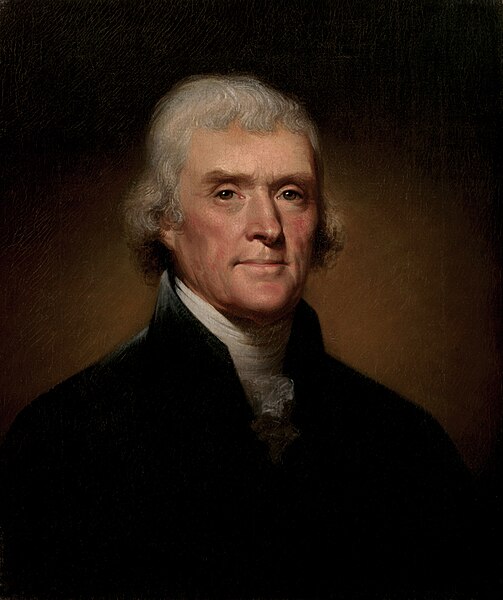
Portrait of Thomas Jefferson
- The sailors of the USS Chesapeake considered the incident to be the ultimate tipping point. US Congress approved the Embargo Act in December 1807, and it was subsequently signed into law by Jefferson on 22 December 1807.
- Jefferson hoped that the enactment would avert a conflict between the US and Britain. Simultaneously, Jefferson perceived it as a means to safeguard naval vessels from potential danger, provide an opportunity for their maintenance, and symbolise (following the Chesapeake incident) the acknowledgement by the US that a conflict was imminent.
- Jefferson also viewed it as a means to put an end to unproductive war profiteering, which was undermining the desired but never attained objective of American autarky – economic self-sufficiency from Britain and other economies. The Embargo Act of 1807 did the following:
- All ships and vessels under US authority were subjected to an embargo.
- All ships and vessels were prohibited from gaining clearance to travel to foreign ports or locales.
- The US President was granted the authority to provide exemptions for ships under his direct supervision.
- The US President was granted the authority to give revenue officers and the Navy directives.
- Its construction did not aim to impede the departure of any foreign ship or vessel, regardless of whether it carried cargo or not.
- Merchant ships undertaking voyages between US ports were obligated to provide a bond or surety.
- Warships were granted an exemption from the provisions of the embargo.
IMPACT OF THE EMBARGO ACT OF 1807
- According to economic historian Douglas Irwin, the embargo severely impacted American shipping exports. It resulted in an approximate 5 per cent decline in the country’s gross national product in 1807. However, the impact of losing trade with Americans did not significantly harm Britain and France, who were deeply engaged in the Napoleonic Wars. The embargo, originally designed to penalise Europe’s dominant nations, ultimately had adverse consequences for ordinary Americans.
- The limited availability of European goods prompted a surge in American manufacturing, particularly in the Northern region. As a result, textile producers made substantial expenditures in cotton mills.
- Nevertheless, while Britain retained the ability to export to America, primarily through Canada, this advantage only partially offset the current decline in trade and economic progress.
- While the western states in the Union remained largely unscathed due to their limited trading activities, other regions experienced significant economic downturns. Cotton producers in the Southern region saw a complete loss of their British market. Merchants in New England suffered the most severe impact.
- Discontent was pervasive, so local political leaders seriously discussed seceding from the Union, even before the Nullification Crisis or the Civil War.
- Small, intricately carved teapots were produced to strengthen waning public backing for the Embargo Act.
- Encircling the lid was ‘Jefferson and the Embargo’. On one side was ‘Mind your business’, and on the other ‘Prudence is the best Remedy for hard times’.
- Another consequence of the embargo was a surge in cross-border smuggling with Canada and a rise in maritime smuggling. The Act proved to be both ineffectual and challenging to enforce.
- Many of these vulnerabilities were rectified through various amendments and newly enacted legislation drafted by Albert Gallatin, the Secretary of the Treasury under Jefferson.
- These measures were subsequently approved by Congress and signed into law by Jefferson. However, Jefferson essentially withdrew his active endorsement after publicly indicating his intention not to pursue a third term in office in December 1807.
- The embargo not only tarnished Jefferson’s administration, resulting in a significant decline in popularity by its conclusion, but the economic repercussions also persisted until the War of 1812. The War of 1812 was a conflict between the US and the United Kingdom and their respective indigenous allies in British North America.
REPEAL OF THE EMBARGO ACT OF 1807
- Despite the efficacy of the embargo in averting war, its adverse repercussions compelled President Jefferson and Congress to contemplate revoking the policy. The American economy was experiencing hardship, leading to a shift in public sentiment against the embargo. Furthermore, illicit imports ensured a continuous flow of products to Great Britain, mitigating the adverse impact on British trade that the embargo’s creators had aimed for.
- The price of goods in Britain initially experienced an impact. However, the Britons swiftly adjusted to the modified prices and compensated for their reduced North American trade by engaging in South American business.
- Essential items that alternative trading partners could not substitute were not crucial for the country’s survival. On the other hand, France appeared to embrace the American embargo as it aligned with Napoleon’s Continental System.
- In late 1808, the House Foreign Affairs Committee, led by George Washington Cabell of Tennessee, was responsible for drafting a report that provided a comprehensive analysis of the US relationship with Britain and France. The study also included policy recommendations. The group prepared three distinct resolutions.
- The initial action was to authorise a partial repeal with submission.
- The second action was to enforce a non-importation statute against France.
- The third objective was to initiate military preparations.
- Jefferson delegated the choice to Congress and implored Congressmen to respect the findings provided by Cabell’s committee. Following a lengthy and verbose discussion, the committee concluded that replacing the embargo with a revitalised non-intercourse statute would be the most suitable course of action.
- According to the proposed statute, all countries, except Britain and France, would be excluded from the embargo. Simultaneously, French and British vessels would be prohibited from entering American seas.
- Jefferson enacted the Non-Intercourse Act on 1 March 1809, just three days prior to the end of his term in office. The legislation empowered the President to proclaim that the nation was secure enough to engage in foreign trade with specific countries following the conclusion of the European conflicts.
- In 1810, the government was prepared to implement Macon’s Bill Number 2, a method of economic compulsion considered a last resort. The legislation was enacted on 1 May 1810 and superseded the Non-Intercourse Act. It recognised that using economic pressure to force the European powers to comply had failed.
- The US now opened up trade with Britain and France and attempted to negotiate with both countries involved in the conflict. If either nation were to lift its limitations on American commerce, the United States would reinstate non-intercourse measures against the power that had not done so.
- Napoleon promptly capitalised on that opportunity. He committed to revoking his Berlin and Milan Decrees, and in the autumn of 1810, the then US President James Madison restored non-intercourse measures against Britain.
- Despite Napoleon’s failure to fulfil his pledge, the tense relations between Britain and the US prevented him from being held accountable for his deceit. Jefferson and Madison’s efforts to achieve acknowledgement of American neutrality by peaceful methods were ultimately successful in June 1812, when Britain officially pledged to remove its 1807 Orders in Council.
- The British concession arrived belatedly, as by the time word reached America, the US had already proclaimed the War of 1812 against Britain.
Frequently Asked Questions
- What was the Embargo Act of 1807?The Embargo Act of 1807 was a law passed by the United States Congress and signed into law by President Thomas Jefferson, which prohibited American ships from trading in all foreign ports, effectively imposing a total embargo on American exports and imports.
- What was the purpose of the Embargo Act?The Embargo Act was enacted in response to issues such as impressment of American sailors by British naval forces, violations of American neutrality by both France and Britain, and economic pressures resulting from the Napoleonic Wars. Its aim was to pressure Britain and France into respecting American neutrality and maritime rights by depriving them of American trade.
- Did the Embargo Act achieve its intended goals?No, the Embargo Act did not achieve its intended goals. Instead of pressuring Britain and France, it caused severe economic hardship for American merchants, shipowners, and farmers whose livelihoods depended on foreign trade. The act also failed to prevent British and French violations of American maritime rights.
